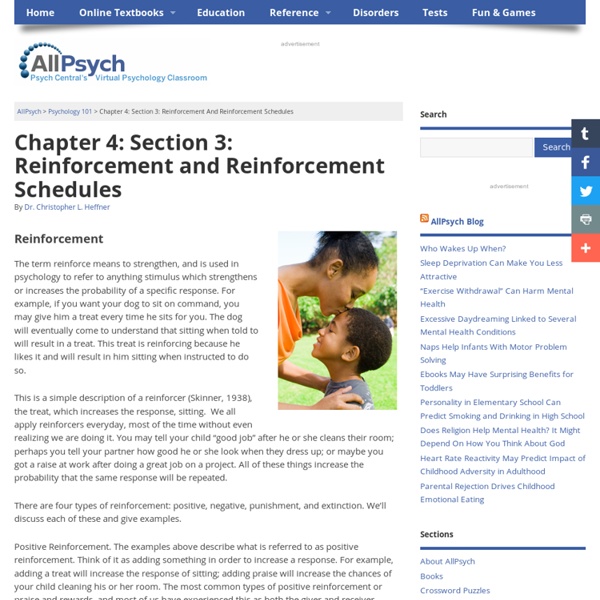Reinforcement and Punishment in Psychology 101 at AllPsych Online

https://allpsych.com/psychology101/reinforcement/
Related: Using 'Reinforcement' and 'Punishment' to influence the behaviour of teenage children
Changing Behavior Through Reinforcement and Punishment: Operant Conditioning
In classical conditioning the organism learns to associate new stimuli with natural, biological responses such as salivation or fear. The organism does not learn something new but rather begins to perform in an existing behavior in the presence of a new signal. Operant conditioningLearning that occurs based on the consequences of behavior., on the other hand, is learning that occurs based on the consequences of behavior and can involve the learning of new actions. Operant conditioning occurs when a dog rolls over on command because it has been praised for doing so in the past, when a schoolroom bully threatens his classmates because doing so allows him to get his way, and when a child gets good grades because her parents threaten to punish her if she doesn’t.
Negative Reinforcement and Operant Conditioning
Negative reinforcement is a term described by B. F. Skinner in his theory of operant conditioning.
Positive vs Negative Punishment - Psychestudy
Punishment is a fundamental concept of Operant Conditioning, whose major objective is to decrease the rate of certain undesired behavior from occurring again. Punishment can be further classified into two major parts These two different types of punishment have got both similarities and differences, as the major purpose of both these punishment types is to decrease the rate of certain undesired behavior. By introducing the concept of punishment to an individual, the individual gets the idea that what he/she is doing, is wrong. Positive and negative punishment, generally speaking, is the concept of adding certain unfavorable consequence or depriving the individual of certain favored item or advantage, in order to decrease the behavior. Differences Between Positive and Negative Punishment
Teens May Learn Best with Positive Reinforcement
A new study finds that adolescents focus on rewards and are less able to learn to avoid punishment or consider the consequences of alternative actions. University College-London investigators compared how adolescents and adults learn to make choices based on the available information. Investigators tracked the way in which 18 volunteers aged 12-17 and 20 volunteers aged 18-32 completed tasks in which they had to choose between abstract symbols. Each symbol was consistently associated with a fixed chance of a reward, punishment, or no outcome. As the trial progressed, participants learned which symbols were likely to lead to each outcome and adjusted their choices accordingly.
Using Reinforcement and Punishment at Home
How do I get my child to listen to me at home? This is a common question I hear from parents. One solution is by using the basic principles of reinforcement and punishment. These principles will allow parents to gain control over their child’s behavior, and they will begin to see a decrease in negative behaviors and an increase in positive behaviors at home. Tips for Using Reinforcement at Home Reinforcement is a consequence following a behavior that increases the probability that the behavior will increase in the future.
Positive And Negative Reinforcement (Examples, Punishment) - Parenting For Brain
Reinforcement and punishment are often used as parenting tools to modify children’s behavior. Let’s review the difference between positive reinforcement and negative reinforcement, and the difference in outcomes between them. The Difference Between Positive And Negative Reinforcement In behavioral psychology, reinforcement is the introduction of a favorable condition that will make the desired behavior more likely to happen, continue or strengthen in the future1. Because the favorable condition acts as a reward, reinforcement is a reward-based operant conditioning. There are two types of reinforcement: positive reinforcement and negative reinforcement.
Difference Between Negative Reinforcement And Punishment
Behavioral Psychology By Michael Schreiner | March 20, 2015 A question that always pops up in behavioral psychology is what the difference is between negative reinforcement and punishment. The confusion is understandable because both forms of control have aversive stimuli embedded within them, in other words something that the organism wants to avoid. Where they differ then is in their consequences.
Positive Vs Negative Reinforcement - Psychestudy
Reinforcement is a fundamental concept of Operant Conditioning, whose major objective is to increase the rate of certain undesired behavior from occurring again. Reinforcement can be further classified into two major parts The major purpose of both these reinforcement types is to increase the rate of certain behavior although they have many similarities and differences.
Related:
Reinforcement and Punishment - How Parents Can Influence The Behavior of Their Teenage Children
•
108TMA01
•
Combat




From this article, it can be summarised, that there are 4 types of reinforcements - positive, negative, punishments and extinction. Though each is applied differently, they bring about a similar result - to improve behaviour. Currently, it can be seen that positive reinforcements seems to have a better resulting effect on children. This could be due to our human need to want praises and encouragements, as opposed to scoldings and disciplinary measures. by fareeshahdawoodepeer Sep 24